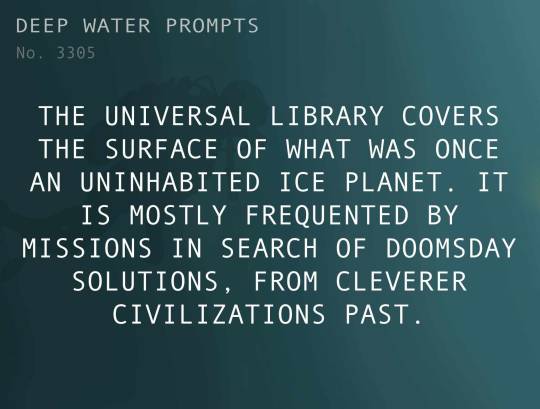Text
Cliches and Tropes
I get a lot of questions reading, “If my character does this/if my story does this/if this happens, is it cliche?” And in many cases the asker’s “cliched” situation is actually a trope. What is the difference? tvtropes sums it up best:
Tropes are devices and conventions that a writer can reasonably rely on as being present in the audience members’ minds and expectations. On the whole, tropes are not cliches. The word clichéd means “stereotyped and trite.” In other words, dull and uninteresting.
For example, you can reasonably presume the protagonist is an orphan or has at least one dead/missing parent. This is a trope. The father turning out to be Super Important or the Big Evil is a cliche. Those are some of my least favorite cliches. However, I still read - and enjoy - works with the Super Important Missing Dad, monogamous love triangles, and genetic magic. In a similar vein, audiences will stomach most of your cliches.
Reading cliches reminds me of my great-grandfather, who was stationed on the same island as a pineapple plantation in World War II. By the time he came home, he had eaten so much pineapple that he swore he would never eat a pineapple again. Pineapple - cliches - taste good when you consume them the first few times. Excessive intake of pineapples, cliches, or anything else will make you hate it.
To that extent, it is your job as a writer to mask the pineapples (cliches) with other tastes, like the awesome and original characters or the complex storyline or the plot twists that will make the audience reel. You can have some cliches, as long as the rest of the story makes up for it. Subverting cliches is cool, because the audience thinks “Dammit! Another pineapple!” but then you whisk away the covering to reveal the pineapple is actually a grapefruit and the audience is relieved and intrigued. But subverting cliches is not necessary for the success of a story.
There are cliches you should destroy root and stem: cliches that stereotype people by their race, ethnicity, religion, appearance, sexuality, gender, income, and/or ability. Those cliches perpetuate inequality and oppression. You, being a decent human being, should not include them - or, if they are included, to show them as wrong or not encompassing the character’s entire personality. Use tropes and plot or setting cliches if you will, but do not put people in boxes made of false generalizations.
#writing#writers on tumblr#writers#writing prompt#writer#my writing#daily writing prompt#daily writing#story#writing tool
1K notes
·
View notes
Text
Poetry never dies because it abounds in your galaxy eyes, in your lips of spring, in your heart so wild. Poetry beats in the scent of your skin calling me to write it with my hands, with my lips as I say your name, with my heart as it beats with you in it.
e.v.e.
26 notes
·
View notes
Text
Writeblr Resources: Writing Realistic Scientists
This rant is brought to you by the sasquatch program I was listening to on the way home from work and how glibly it insisted that scientists were suppressing the evidence. While the theories that the sasquatch advocate threw out there were interesting in terms of story potential, they reminded me how few writers have a science background.
Personally, I have a BS in environmental science, i.e. being shuffled between the geography, biology, and chemistry departments for four years, and I’m currently employed as a microbiologist, so I do have that background. Have 10 (yes, 10) of my pet peeves.
1. The Omnidisciplinary Scientist, or as I like to call it, the comic book scientist. Scientists specialize heavily. You will get a grounding beyond the layperson’s high school coverage of fields related to yours if you go into a science, but it won’t be ALL fields of science. I have a less than high school level grasp of physics due to the fact that it was never required in my field. When you get really deep into technical stuff, however, two people in the same broad field might not know much about the other’s specialty. A particle physicist and an astrophysicist might only have a very basic grounding in each other’s experiments, though they’ve got a leg up on me in explaining them to each other.
A physicist telling a neuroscientist that they’ve discovered consciousness doesn’t read as good science, nor should you cite a dentist as a “scientist” in your argument about global warming.
2. Instant Results. CSI and other police procedurals are the primary culprits here, but also scifi tends to give people instant confirmation of what something is. Whether that’s germ identification, a blood test, or a chemical reaction, all experiments require setup time, controlled conditions, correct equipment, and analysis. If the machine does all the work in a few minutes, you don’t need a scientist.
For example: pregnancy tests used to take weeks, because urine samples from the potentially pregnant person had to be shipped to a lab, injected into frogs, and then the frogs had to be monitored to see if they released eggs. Now, you pee on a stick, because scientists spent years finding a quick chemical reaction (actually a change of reactions) that gave you a simple visible sign that specific hormones were present in your pee.
The frogs, presumably, are very relieved.
3. The insanely well-funded science lab. All experiments take money. Whether it’s for materials, equipment, or to pay an undergrad to count fruit flies every six hours, it’s just not plausible for most scientists to have every single piece of equipment they could ever need - and not all of the tools are publicly purchasable to begin with. My brother works with a biologist who has had to design a program to do statistics on bone shapes from almost scratch - when it’s done and they’ve published a paper on it, it will be publicly available, but until that happens, anyone who has to do the same analysis has to put years into developing the protocol themselves.
Also, as an example I’ve actually worked with, a Gas Chromatography Mass Spectrometer (a relatively common, if fancy, instrument in chemistry that can identify most chemicals with the right person running it,) can cost a hundred thousand dollars used. Routine maitenance (replacing a consumable part like the coil,) can cost hundreds of dollars, and if you use the machine more frequently you have to do it more frequently. And god forbid something goes wrong with the mechanical parts or the programming - it’s hardwired to a computer as old as your undergrad, and the last time they manufactured any replacement parts for the thing was 1986.
(If you want to hack one of these investment pieces of equipment by the way, forget about it - even something with a modern OS probably isn’t internet-enabled, as there is nothing that researchers hate more than waiting for an OS update before they can finish an experiment. Even relatively cheap instruments that run off a cheap modern laptop are pretty routinely debugged by having the wifi disabled, as nine times out of ten your program being messed up is because Windows updated. You have to physically go to the machine, put the files on a jump drive IF they are readable outside the program, and transfer them to something else. Or you can screenshot them and export the pics onto the jump file. Or copy them into excel and transfer the excel file.)
Addendum: hacking does not work like that. If you’ve seen it in a movie, it is either outdated in terms of computer science, or excessively dumbed down.
4. The Work dies with the scientist. If your work will be lost if you should meet with an unhappy fate, you are a supremely shitty scientist. First - very few fields that aren’t pure mathematics or computing can be undertaken solo. Academics have postdocs to do the analysis, grad students to do the specialized lab work, and undergrads to do the prep work. Businesses have PhD’s to do the final analysis, junior scientists to design and run experiments, and lab techs to clean up after them, and provide explanation for why the GCMS is disabled while windows updates. (Full disclosure: the reason I’m harping on this is because it happened to me with a spectrophotometer and I’m still not over whoever re-enabled the wifi.)
Also, though a company or secret shady government agency will not release your work for peer review the way an academic institution will, they will need the documentation of your work to file patents, or replicate it with the rest of their researchers.
If the field has merit and enough funding that other people will actually spend time on the same experiment, no one lone genius is the only person who could ever make a discovery. In fact, discoveries are independently replicated all the time, because most of them are enabled by other discoveries or new technology.
5. Absence of evidence is not evidence of absence. Science is a delicate balance between admitting that something *could* be happening and pointing out that just because I haven’t proven you wrong yet doesn’t mean that you’re right.
A plausible use of the absence of evidence: “We haven’t found any Higgs Bosons yet, but that does not mean that they don’t exist.” (As of 2013 they found some.) It’s plausible because all evidence suggested that the HB was possible, its existence strengthened longstanding theories that hundreds of people had failed to disprove and dozens of people had discovered supporting evidence of, and because it was something they could test for with the available technology.
An implausible use “We haven’t found any conclusive evidence of Sasquatches, but that doesn’t mean they don’t exist.” It’s implausible because we don’t have any credible evidence that they do exist - there is no longstanding theory or model that claims that the pacific northwest can support a significant population of bear sized hominid omnivores, and no plausible physical evidence that such creatures ever existed. It contradicts a whole host of theories in a lot of scientific disciplines: Ecology would posit that we would know about the role of such a large omnivore since they’d have a similar impact on local resources to an equivalent amount of bears, the recent fossil record and paleoarchaeology have yet to find any evidence that homonids other than anatomically modern humans have lived in north america, statistics would argue that if the creature is common enough and lives close enough to humans for sightings to ever be reported it would leave some evidence more credible than eyewitness testimony behind.
6. Contradiction is proof of being wrong. A single data point contradicting a theory is almost never an indication that the theory has been disproven. Science is done by humans, and mistakes are made. Similarly, a single success is not proof that you’re right. You need to do an experiment a lot to have enough data to be certain that what you think is happening is actually happening.
For example, those of you who took a statistics class can attest that just because you flipped a coin ten times and it landed on heads seven times doesn’t mean that you’re twice as likely to come up heads. You need to flip it a hundred times or more to have enough data to really do anything with it.
#writing#writers on tumblr#writers#writing prompt#writer#my writing#daily writing prompt#daily writing#story#writing tool
529 notes
·
View notes
Text
Here's to the people who can't get the words on the page. The people who are too tired after all life throws at them to write. The people who are blocked. The people who are burnt out. The people who can't write because of physical or mental illnesses. The people who don't know why they can't write. And the people struggling with all those other things that get in the way of writing and make it seem or be impossible.
You're still a writer, you're still an artist. And you matter. This world is better since you're in it. Thank you for wanting to write, even if you can't right now. I hope you and your words find each other soon.
#writing#writers on tumblr#writers#writing prompt#writer#my writing#daily writing prompt#daily writing#story#writing tool
6K notes
·
View notes
Text

Text: The Universal Library covers the surface of what was once an uninhabited ice planet. It is mostly frequented by missions in search of doomsday solutions, from cleverer civilizations past.
#creative writing#writing prompts#space and aliens#libraries#is this basically the plot of that dr who episode its been so long since i watched it
85 notes
·
View notes
Text

Tamura Hono
9 notes
·
View notes
Text
Her name feels smooth,
It drips off of your tongue like poetry
Your lips curve and dance to each syllable
And your eyes search for her.
My name sounds rough.
It falls out of your mouth like your teeth
Clanking on the floor and echoing in the silence.
You wince. Each syllable cuts your gums
And your hands grab at your throat for air.
I thought with time it wouldn’t hurt
That when I’d call you,
You’d come.
And when you called me
It wouldn’t sound so temporary.
9 notes
·
View notes
Text

Cappadocia at night, Turkey
64 notes
·
View notes
Text
Conversation Prompt
“Have you been leaving the poison cabinet unlocked?! There have been seven different poisonings in the past three weeks! Why are you only bringing this up now?!”
“In my defence, I always said that having a poison cabinet was a terrible idea. And I refuse to take any responsibility for it going wrong.”
“Responsibility?! Keeping it locked was your only freaking job!”
19 notes
·
View notes
Text
Stinkpot - Stinkballs
This is a rather mean weapon that was rather less known. A stinkpot was usually a fire pot made of clay and thus easily breakable, which was dipped in pitch and equipped with one or more igniters. The pot itself could be filled with easily flammable material as well as very considerable smelling substances (sulphur, black powder, pitch, tallow, faeces, asa foetida, various putrefaction products, arsenic methyl and cacodyl, which ignites itself in the air, etc.) and after activating the individual detonators it was hurled, shot, thrown, catapulted or dropped from the yards towards the enemy ship’s deck. These stink bombs were used to disorientate and confuse the enemy.
British Admiral Sir William Robert Kennedy described the use of the stinkpot in 1856 during the Second Opium War in his book Hurrah for the Life of a Sailor - Fifty Years in the Royal Navy.
The stinkpot is an earthen vessel filled with powder, sulphur etc. Every junk had cages at the head of the mast, manned in action by one or more men, whose business it was to throw these stink-pots on the enemy’s decks, or into boats trying to get on board; and woe betide the unfortunate boat that got one of these missiles off: The crew were sure to jump overboard or suffocate.
One man climbs the foremast and one the mizzenmast, all going all the way up and staying on the highest yard. Two men stand at the foot of each mast and pull up the baskets with the skunk pots using a pulley. Each basket contains ten or more stink pots, and each pot has 4-pound rolls enclosed in cotton sleeves. These are pulled up briskly and then lit by the men at the mast head with matches, which are then immediately discharged. When one basket is emptied, another is pulled up, ensuring an uninterrupted supply on board the barbarian ship.
It is not known exactly when the stinkpot emerged. Some sources claim that this weapon was only introduced in the 19th century, but there are drawings from the 18th century that show stinkpots on ships.

War Cutter with Stink Pot on the Bowsprit (French here: pot á feu (A), illustration from Ozanne’s Marine Militaire of 1762. The stink pot was simply dropped from the bowsprit onto smaller ships. (x)
Therefore, it can be assumed that the stinkpot was used much earlier, whether by pirates or various navies.
102 notes
·
View notes
Video
The scene in which Peter Parker catches Mary Jane’s lunch on the tray involved no CGI. With the help of a sticky substance to keep the tray planted on his hand, Tobey Maguire eventually (after many takes) performed the stunt exactly as seen.
833 notes
·
View notes
Photo

the scene in Matrix Reloaded when Trinity hacks into a power station’s computer is actually an accurate portrayal of a hack exploiting a real SSH vulnerability.
follow us to get more updates: unbelievable facts
212 notes
·
View notes
Text

#writing#writers on tumblr#writers#writing prompt#writer#my writing#daily writing prompt#daily writing#story#writing tool#writers just get it
16K notes
·
View notes
Text
If you would’ve known that that stupid river was the fountain of youth, you never would’ve drank from it. That was 300 years ago. You’re permanently stuck at age 26. The only one you really have left in your life is your horse, who also made the mistake of drinking from it.
6K notes
·
View notes
Text
btw the majority of your life will be lived as a adult. yeah i don't make the rules. go have fun in your 40s or 70s or whatever. no one expects you to accomplish everything at 17 or 27. you've got time and in the meantime get some life experience, it will pay off
28K notes
·
View notes

